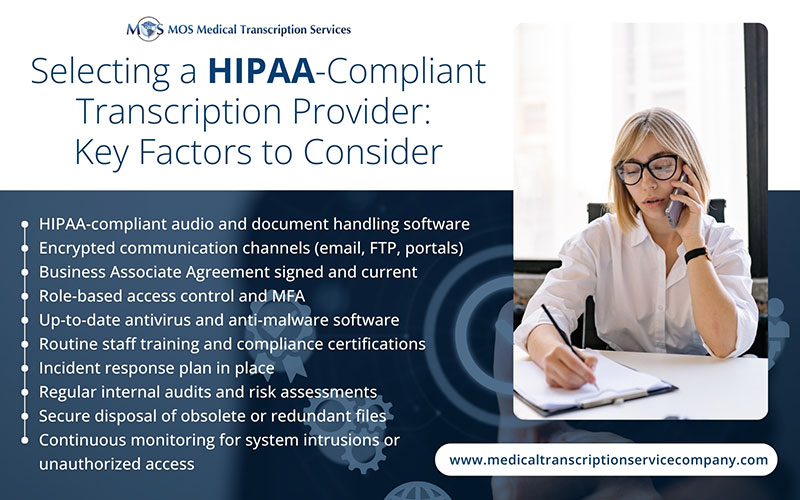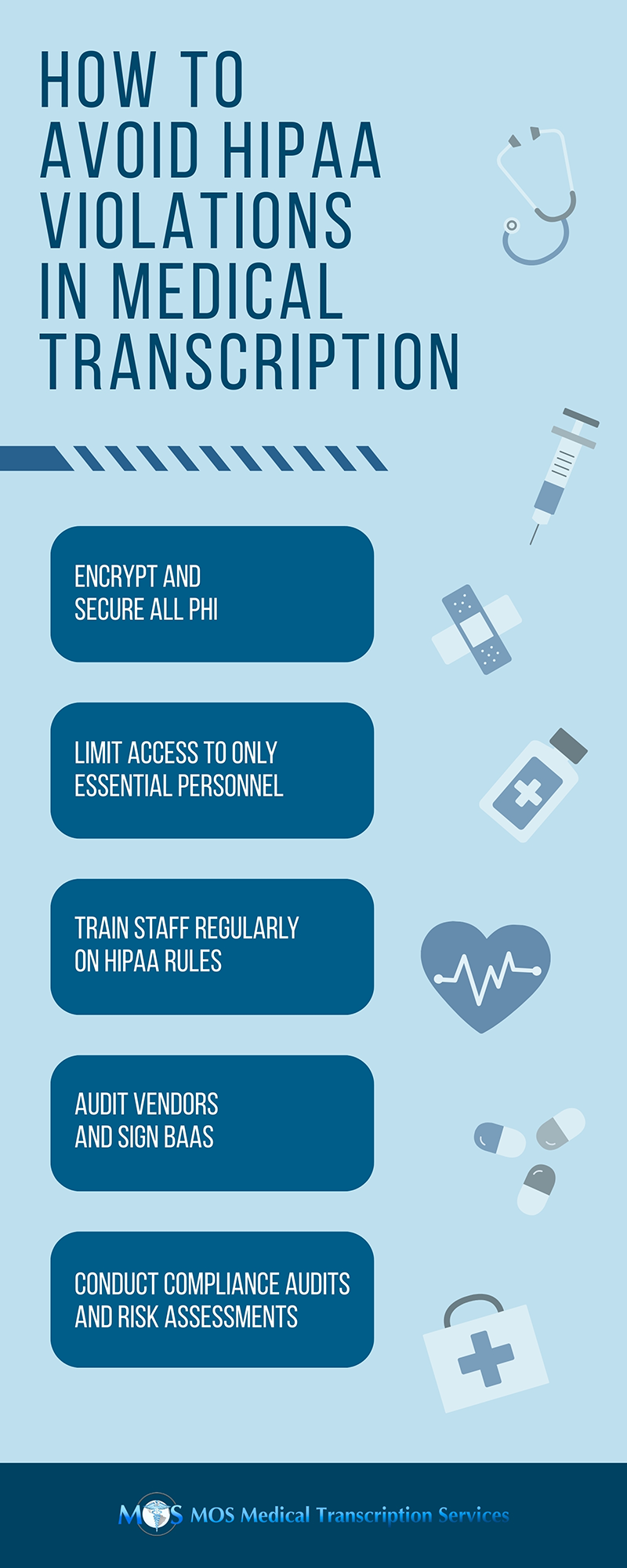Table of Contents
Most healthcare facilities, individual practitioners and group practices are now outsourcing their transcription jobs. In the United States, numerous established companies offer quality transcription services. Medical transcription services play a critical role in the healthcare documentation process, but with this responsibility comes the obligation to protect highly sensitive patient data. The Health Insurance Portability and Accountability Act (HIPAA) was specifically formulated to safeguard patient identities, and protect the rights of individuals and their health information through enhanced security standards.
With the rising risk of cybersecurity breaches, the need for robust HIPAA compliance has never been more urgent. Selecting a professional medical transcription company providing HIPAA compliant services is essential to safeguard the confidentiality of patient medical records.
The High Stakes of HIPAA Compliance in Medical Transcription
As of December 9, 2024, over 168 million individuals had been affected by healthcare data breaches reported to the U.S. Department of Health and Human Services (HHS) Office for Civil Rights (OCR)—a record-breaking figure. Alarmingly, In 2024, the ten largest healthcare data breaches, as reported to the HHS Office for Civil Rights, impacted approximately 137 million individuals, with nine out of ten caused by hacking or IT-related incidents, many involving the network servers of HIPAA business associates.
For medical transcription providers, this is a stark reminder: if your service touches Protected Health Information (PHI), your security standards matter just as much as those of healthcare providers themselves.
In a powerful statement, the HHS report noted, “The American public has witnessed disruptive attacks on its healthcare sector that jeopardize sensitive personal information, delay medical treatment, and ultimately may lead to increased suffering and death.” In response to these escalating threats, on December 27, 2024, the OCR announced a Notice of Proposed Rulemaking to revise and strengthen the HIPAA Security Rule, aiming to better address modern cybersecurity threats within the healthcare sector.
What This Means for Medical Transcription Services
Medical transcriptionists and vendors are considered HIPAA business associates, and as such, they are directly subject to HIPAA’s Privacy and Security Rules. With the regulatory landscape evolving, compliance is no longer just about avoiding fines—it’s about ensuring patient safety, protecting your reputation, and maintaining trust.
Some key developments to be aware of:
- In 2023, HHS released its Healthcare Sector Cybersecurity Concept Paper, outlining voluntary best practices and paving the way for stronger regulations.
- In October 2024, HHS and NIST resumed their joint “Safeguarding Health Information” conference, emphasizing the urgent need for updates to the HIPAA Security Rule after a five-year hiatus.
- Legal and financial consequences are increasing, with greater enforcement activity, higher penalties, and a rise in cybersecurity-related lawsuits.
The bottom line is clear: in the words of HHS, “cybersecurity is patient safety.” For medical transcription providers, that means adopting a proactive, not reactive, approach to HIPAA compliance. Today, there are more resources than ever to help transcription companies align with federal cybersecurity standards, and regulators and courts will no longer accept excuses for inadequate safeguards.
Features of HIPAA-Compliant Medical Transcription Services
Ensuring HIPAA compliance requires a holistic approach that includes people, processes, and technology. Here are the key measures that HIPAA complaint transcription companies implement to protect patient information:
- 1. Secure File Transfer and Storage
- End-to-end encrypted file transfer systems for audio and text files.
- Transcribed records stored only on HIPAA-compliant cloud platforms or secure, access-controlled local systems.
- 2. Strong Access Controls
- Only authorized personnel are allowed to access to PHI.
- Multi-factor authentication (MFA) for all user logins.
- Maintaining detailed access logs to track who accessed what and when.
- 3. Regular Workforce Training
- Regular HIPAA and cybersecurity training for all staff, including transcriptionists, editors, and QA specialists.
- Inclusion of phishing awareness and incident reporting protocols in the training programs.
- 4. Have a Business Associate Agreement (BAA) in Place
- Sign a BA with the healthcare provider.
- Adhere to the terms of the BAA, which clearly defines responsibilities regarding PHI handling, breach notification, and security protocols.
- 5. Regular Auditing and Updating of Security Measures
- Perform periodic risk assessments and penetration testing to identify vulnerabilities.
- Stay updated with new HHS guidelines, especially in light of the upcoming Security Rule revisions.
Why Choose MOS for HIPAA-Compliant Medical Transcription?
MOS Medical Transcription Service is a HIPAA company equipped with advanced technology, software utilities and dictation options. We provide quality transcripts for all types of medical reports such as patient history and physical reports, consultation notes, x-ray reports, referrals, laboratory summaries, office notes, follow-up letters, discharge summaries, and more. Speciality-specific, customized reports are available. The top benefits of our services include:
- Stringent quality assurance
- 99% accuracy
- EHR integration
- Rapid turnaround time
- Toll free number and digital dictation options
- Document flow management for end-to-end tracking of data
- 24×7 technical assistance
- Availability of full workflow modules
Partner with us to experience secure, accurate, and efficient documentation tailored to the unique needs of your practice or facility.




